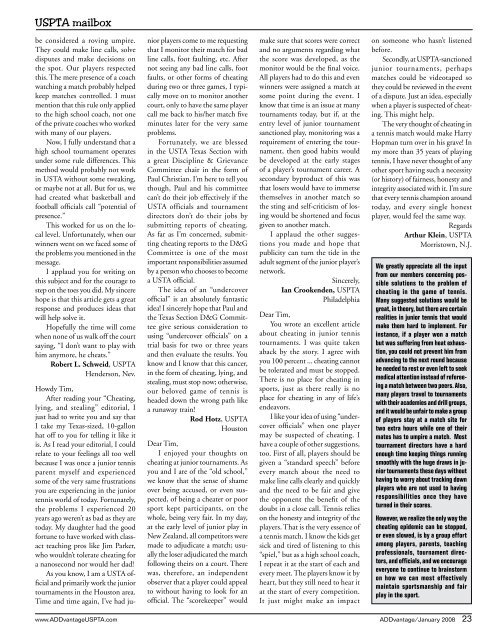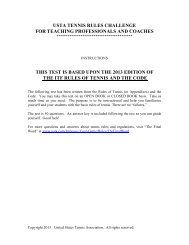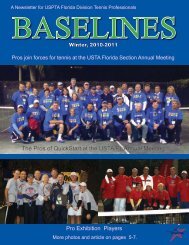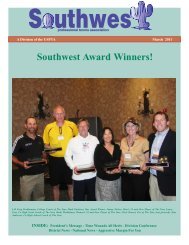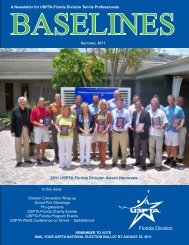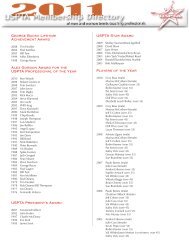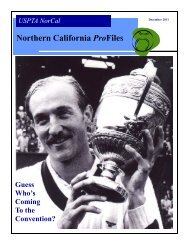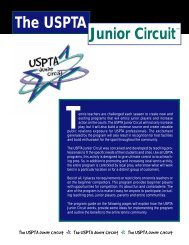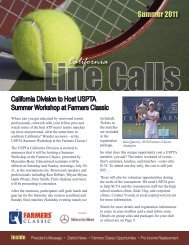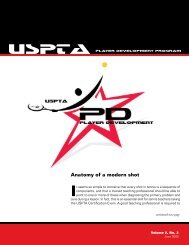De Part Ments - United States Professional Tennis Association
De Part Ments - United States Professional Tennis Association
De Part Ments - United States Professional Tennis Association
Create successful ePaper yourself
Turn your PDF publications into a flip-book with our unique Google optimized e-Paper software.
USPTA mailbox<br />
be considered a roving umpire.<br />
They could make line calls, solve<br />
disputes and make decisions on<br />
the spot. Our players respected<br />
this. The mere presence of a coach<br />
watching a match probably helped<br />
keep matches controlled. I must<br />
mention that this rule only applied<br />
to the high school coach, not one<br />
of the private coaches who worked<br />
with many of our players.<br />
Now, I fully understand that a<br />
high school tournament operates<br />
under some rule differences. This<br />
method would probably not work<br />
in USTA without some tweaking,<br />
or maybe not at all. But for us, we<br />
had created what basketball and<br />
football officials call “potential of<br />
presence.”<br />
This worked for us on the local<br />
level. Unfortunately, when our<br />
winners went on we faced some of<br />
the problems you mentioned in the<br />
message.<br />
I applaud you for writing on<br />
this subject and for the courage to<br />
step on the toes you did. My sincere<br />
hope is that this article gets a great<br />
response and produces ideas that<br />
will help solve it.<br />
Hopefully the time will come<br />
when none of us walk off the court<br />
saying, “I don’t want to play with<br />
him anymore, he cheats.”<br />
Robert L. Schweid, USPTA<br />
Henderson, Nev.<br />
Howdy Tim,<br />
After reading your “Cheating,<br />
lying, and stealing” editorial, I<br />
just had to write you and say that<br />
I take my Texas-sized, 10-gallon<br />
hat off to you for telling it like it<br />
is. As I read your editorial, I could<br />
relate to your feelings all too well<br />
because I was once a junior tennis<br />
parent myself and experienced<br />
some of the very same frustrations<br />
you are experiencing in the junior<br />
tennis world of today. Fortunately,<br />
the problems I experienced 20<br />
years ago weren’t as bad as they are<br />
today. My daughter had the good<br />
fortune to have worked with classact<br />
teaching pros like Jim Parker,<br />
who wouldn’t tolerate cheating for<br />
a nanosecond nor would her dad!<br />
As you know, I am a USTA official<br />
and primarily work the junior<br />
tournaments in the Houston area.<br />
Time and time again, I’ve had junior<br />
players come to me requesting<br />
that I monitor their match for bad<br />
line calls, foot faulting, etc. After<br />
not seeing any bad line calls, foot<br />
faults, or other forms of cheating<br />
during two or three games, I typically<br />
move on to monitor another<br />
court, only to have the same player<br />
call me back to his/her match five<br />
minutes later for the very same<br />
problems.<br />
Fortunately, we are blessed<br />
in the USTA Texas Section with<br />
a great Discipline & Grievance<br />
Committee chair in the form of<br />
Paul Christian. I’m here to tell you<br />
though, Paul and his committee<br />
can’t do their job effectively if the<br />
USTA officials and tournament<br />
directors don’t do their jobs by<br />
submitting reports of cheating.<br />
As far as I’m concerned, submitting<br />
cheating reports to the D&G<br />
Committee is one of the most<br />
important responsibilities assumed<br />
by a person who chooses to become<br />
a USTA official.<br />
The idea of an “undercover<br />
official” is an absolutely fantastic<br />
idea! I sincerely hope that Paul and<br />
the Texas Section D&G Committee<br />
give serious consideration to<br />
using “undercover officials” on a<br />
trial basis for two or three years<br />
and then evaluate the results. You<br />
know and I know that this cancer,<br />
in the form of cheating, lying, and<br />
stealing, must stop now; otherwise,<br />
our beloved game of tennis is<br />
headed down the wrong path like<br />
a runaway train!<br />
Rod Hotz, USPTA<br />
Houston<br />
<strong>De</strong>ar Tim,<br />
I enjoyed your thoughts on<br />
cheating at junior tournaments. As<br />
you and I are of the “old school,”<br />
we know that the sense of shame<br />
over being accused, or even suspected,<br />
of being a cheater or poor<br />
sport kept participants, on the<br />
whole, being very fair. In my day,<br />
at the early level of junior play in<br />
New Zealand, all competitors were<br />
made to adjudicate a match; usually<br />
the loser adjudicated the match<br />
following theirs on a court. There<br />
was, therefore, an independent<br />
observer that a player could appeal<br />
to without having to look for an<br />
official. The “scorekeeper” would<br />
make sure that scores were correct<br />
and no arguments regarding what<br />
the score was developed, as the<br />
monitor would be the final voice.<br />
All players had to do this and even<br />
winners were assigned a match at<br />
some point during the event. I<br />
know that time is an issue at many<br />
tournaments today, but if, at the<br />
entry level of junior tournament<br />
sanctioned play, monitoring was a<br />
requirement of entering the tournament,<br />
then good habits would<br />
be developed at the early stages<br />
of a player’s tournament career. A<br />
secondary byproduct of this was<br />
that losers would have to immerse<br />
themselves in another match so<br />
the sting and self-criticism of losing<br />
would be shortened and focus<br />
given to another match.<br />
I applaud the other suggestions<br />
you made and hope that<br />
publicity can turn the tide in the<br />
adult segment of the junior player’s<br />
network.<br />
Sincerely,<br />
Ian Crookenden, USPTA<br />
Philadelphia<br />
<strong>De</strong>ar Tim,<br />
You wrote an excellent article<br />
about cheating in junior tennis<br />
tournaments. I was quite taken<br />
aback by the story. I agree with<br />
you 100 percent ... cheating cannot<br />
be tolerated and must be stopped.<br />
There is no place for cheating in<br />
sports, just as there really is no<br />
place for cheating in any of life’s<br />
endeavors.<br />
I like your idea of using “undercover<br />
officials” when one player<br />
may be suspected of cheating. I<br />
have a couple of other suggestions,<br />
too. First of all, players should be<br />
given a “standard speech” before<br />
every match about the need to<br />
make line calls clearly and quickly<br />
and the need to be fair and give<br />
the opponent the benefit of the<br />
doubt in a close call. <strong>Tennis</strong> relies<br />
on the honesty and integrity of the<br />
players. That is the very essence of<br />
a tennis match. I know the kids get<br />
sick and tired of listening to this<br />
“spiel,” but as a high school coach,<br />
I repeat it at the start of each and<br />
every meet. The players know it by<br />
heart, but they still need to hear it<br />
at the start of every competition.<br />
It just might make an impact<br />
on someone who hasn’t listened<br />
before.<br />
Secondly, at USPTA- sanctioned<br />
junior tournaments, perhaps<br />
matches could be videotaped so<br />
they could be reviewed in the event<br />
of a dispute. Just an idea, especially<br />
when a player is suspected of cheating.<br />
This might help.<br />
The very thought of cheating in<br />
a tennis match would make Harry<br />
Hopman turn over in his grave! In<br />
my more than 35 years of playing<br />
tennis, I have never thought of any<br />
other sport having such a necessity<br />
(or history) of fairness, honesty and<br />
integrity associated with it. I’m sure<br />
that every tennis champion around<br />
today, and every single honest<br />
player, would feel the same way.<br />
Regards<br />
Arthur Klein, USPTA<br />
Morristown, N.J.<br />
We greatly appreciate all the input<br />
from our members concerning possible<br />
solutions to the problem of<br />
cheating in the game of tennis.<br />
Many suggested solutions would be<br />
great, in theory, but there are certain<br />
realities in junior tennis that would<br />
make them hard to implement. For<br />
instance, if a player won a match<br />
but was suffering from heat exhaustion,<br />
you could not prevent him from<br />
advancing to the next round because<br />
he needed to rest or even left to seek<br />
medical attention instead of refereeing<br />
a match between two peers. Also,<br />
many players travel to tournaments<br />
with their academies and drill groups,<br />
and it would be unfair to make a group<br />
of players stay at a match site for<br />
two extra hours while one of their<br />
mates has to umpire a match. Most<br />
tournament directors have a hard<br />
enough time keeping things running<br />
smoothly with the huge draws in junior<br />
tournaments these days without<br />
having to worry about tracking down<br />
players who are not used to having<br />
responsibilities once they have<br />
turned in their scores.<br />
However, we realize the only way the<br />
cheating epidemic can be stopped,<br />
or even slowed, is by a group effort<br />
among players, parents, teaching<br />
professionals, tournament directors,<br />
and officials, and we encourage<br />
everyone to continue to brainstorm<br />
on how we can most effectively<br />
maintain sportsmanship and fair<br />
play in the sport.<br />
www.ADDvantageUSPTA.com<br />
ADDvantage/January 2008 23


